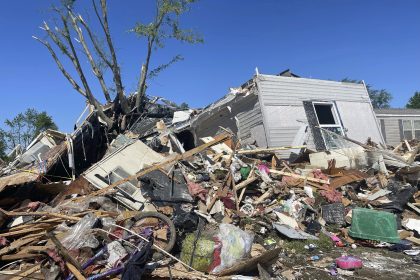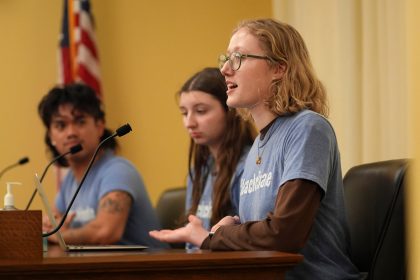Earth Hit an Unofficial Record High Temperature This Week — and Stayed There

Earth’s average temperature on Wednesday remained at an unofficial record high set the day before, the latest grim milestone in a week that has seen series of climate-change-driven extremes.
The average global temperature was 17.18 Celsius (62.9 degrees Fahrenheit), according to the University of Maine’s Climate Reanalyzer, a tool that uses satellite data and computer simulations to measure the world’s condition. That matched a record set Tuesday, and came after a previous record of 17.01 Celsius (62.6 degrees Fahrenheit) was set Monday.
While the figures are not an official government record, “this is showing us an indication of where we are right now,” said National Oceanic and Atmospheric Administration chief scientist Sarah Kapnick. And NOAA indicated it will take the figures into consideration for its official record calculations.
Scientists generally use much longer measurements — months, years, decades — to track the Earth’s warming, but the daily highs are an indication that climate change is reaching uncharted territory.
While some countries had colder weather than usual, high-temperature records were surpassed this week in Quebec and Peru.
In North Grenville, Ontario, the city turned ice hockey rinks into cooling centers as temperatures Wednesday hit 32 degrees Celsius (90 degrees Fahrenheit), with humidity making it making it feel like 38 degrees (100 degrees Fahrenheit).
“I feel like we live in a tropical country right now,” city spokeswoman Jill Sturdy said. “It just kind of hits you. The air is so thick.”
Beijing reported nine straight days last week when the temperature exceeded 35 degrees Celsius (95 degrees Fahrenheit), and ordered a stop to all outdoor work Wednesday, as the temperature reached 41 degrees Celsius (106 degrees Fahrenheit).
On Wednesday, 38 million Americans were under some kind of heat alert, Kapnick said.
Scientists have warned for months that 2023 could see record heat as human-caused climate change, driven largely by the burning of fossil fuels like coal, natural gas and oil, warmed the atmosphere. They also noted that La Nina, the natural cooling of the ocean that had acted as a counter, was giving way to El Nino, the reverse phenomenon marked by warming oceans.
“A record like this is another piece of evidence for the now massively supported proposition that global warming is pushing us into a hotter future,” said Stanford University climate scientist Chris Field, who was not part of the calculations.
One of the largest contributors to this week’s records is an exceptionally mild winter in the Antarctic, according to data from the Climate Reanalyzer. Parts of the continent and nearby ocean were 10-20 degrees Celsius (18-36 degrees Fahrenheit) warmer than averages from 1979-2000.
“Temperatures have been unusual over the ocean and especially around the Antarctic this week, because wind fronts over the Southern Ocean are strong pushing warm air deeper south,” said Raghu Murtugudde, professor of atmospheric, oceanic and earth system science at the University of Maryland and visiting faculty at the Indian Institute of Technology, Bombay.
Chari Vijayaraghavan, a polar explorer and educator who has visited the Arctic and Antarctic regularly for the past ten years says global warming is obvious at both poles, and threatens the region’s wildlife as well as driving ice melt that raises sea levels.
“Warming climates might lead to increasing risks of diseases such as the avian flu spreading in the Antarctic that will have devastating consequences for penguins and other fauna in the region,” Vijayaraghavan said.
University of Maine climate scientist Sean Birkel, creator of the Climate Reanalyzer, said the daily figures are unofficial but a useful snapshot of what’s happening in a warming world.
Even though the dataset used for the unofficial record goes back only to 1979, Kapnick said that given other data, the world is likely seeing the hottest days in “several hundred years that we’ve experienced.”
More frequent, and more intense heat waves disrupted life around the world and caused life-threatening temperatures.
Dr. Hans Henri P. Kluge, regional director for Europe at the World Health Organization, said climate change was attacking the continent “in a big way” which had the potential to wind back 50 years of progress in public health.
Large parts of India and Pakistan faced a days-long heat wave in June that killed over 100 people across the two countries. Temperatures subsided in the last week as the monsoon rains began.
___
Associated Press reporter Sibi Arasu in Bengaluru, India, contributed to this report.
___
Associated Press climate and environmental coverage receives support from several private foundations. See more about AP’s climate initiative here. The AP is solely responsible for all content.

























